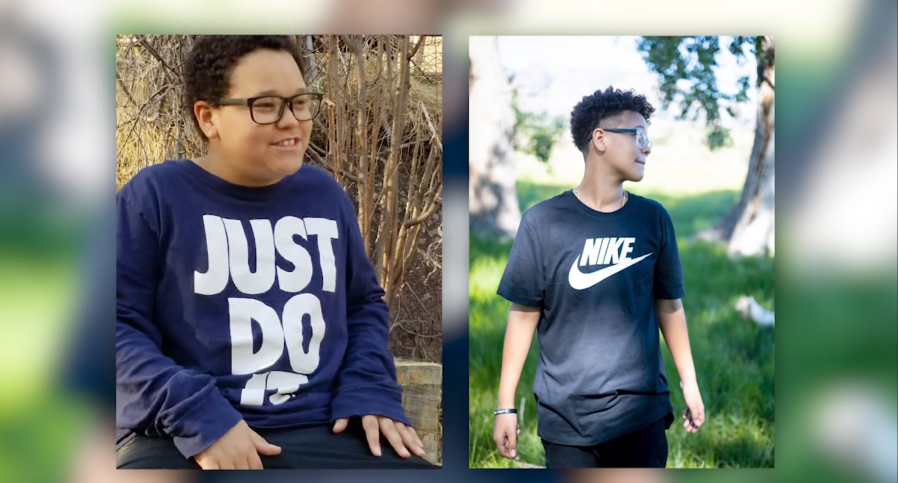JEFFERSON COUNTY, Colo. (KDVR) — A Jefferson County mother is urging parents to listen to their intuition after her teenage son lost 40 pounds in just three months and is now diagnosed with a disease rarely seen in children.
Blair Cooper shares that a mother’s instinct and persistence led to her son being diagnosed with Graves’ disease, which can be fatal if left untreated, and that almost happened to the Cooper family.
“I want parents to take that extra second,” Cooper said. “Don’t let ‘no’ be the last answer that you get. Keep digging because you might find something and save your kid’s life.”
Sheldon Cooper is a typical teenager who loves exercise, basketball and hanging out with his friends. But now the 13-year-old’s life consists of taking daily medication and constantly monitoring his heart rate.
“I was scared, I was frightened, like if I was going to have a heart attack or something. If I ever laid down, I can feel it beating and I can see my glasses moving,” Sheldon shared. “I feel confused because I don’t know if the pill is helping or not.”

Blair Cooper said she and her son embarked on a fitness journey together to exercise and eat healthier, but things took a turn when her son was constantly tired and disappearing before her eyes. From the end of May to August, Sheldon shed 40 pounds.
“I knew something wasn’t right, but a lot of it can be chalked up to puberty,” Blair Cooper said.
She explained to FOX31 that during her son’s annual physical in August she asked the pediatrician for basic lab work multiple times but was told Sheldon was fine and healthy.
“I was told no,” she recalled. “He doesn’t need those, it’s a waste of time, those are a waste of resources.”
Blair Cooper added that she even relayed that her son’s father died young, at 34 years old, from an undiagnosed heart condition, but says she still received pushback because of insurance coverage. Cooper said she didn’t care and paid for the labs out of pocket and the next day the office called, and her son was diagnosed with Graves’ disease.
“Listen to your gut, follow your heart and be a fierce advocate for your kids,” she urged.
Graves’ disease usually seen in young to middle-aged women
Graves’ disease is typically seen in young to middle-aged women and is rare in children and uncommon in men. It’s an immune system disorder of the butterfly-shaped gland in the throat, the thyroid. The thyroid overproduces hormones, and that’s exactly what’s happening to Sheldon, causing his heart rate to skyrocket.
The teen now wears a special watch that tracks his heart rate, and it can’t go above a certain number. Other symptoms Sheldon said he’s experiencing include trouble concentrating at school, bulging eyes, dizziness, shakes and drastic weight loss. Because of this, Sheldon has to sit out during gym class and quit his basketball team.
“It sucks,” Sheldon shared. “I love basketball. It’s the way I cope with everything, so it not being there, makes everything really hard.”
He said he dreams about the day he can get back on the court with his team, but for now, he’s in emergency mode trying to manage his heart rate. His mother said that because the disease is rare in men, especially young boys, she is having trouble getting support and navigating their new norm.
“There’s not a lot out there. There’s not any support that I can find that’s directed towards families and Graves’ disease, and that’s scary,” Blair Cooper said. “I want Sheldon to have a support group. I need someone. If there’s other parents who know this struggle and how to navigate it just a little or an opinion, this community needs that.”
Trying to navigate the difficulties of being a teenager, Sheldon now has to adjust to a new norm that requires constant doctor appointments and tests. But the teen said he is just grateful for his mother and her fight for his health.
“My mom saved my life,” Sheldon said. “If she listened to what the doctors said, I would’ve had a chance of not being here.”
Sheldon is now seeing a specialist at Children’s Hospital in Aurora. His mother said there’s a 25% chance that his thyroid will start producing the right hormone levels and they’re hoping for the best. Meanwhile, it will be a long road for the Cooper family. If you’d like to help with mounting medical costs, click here.
